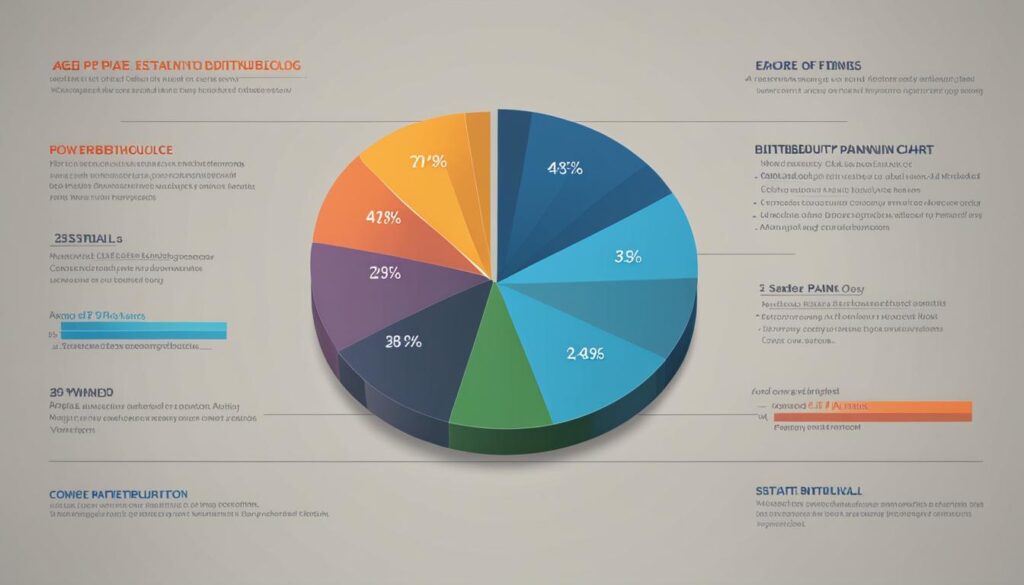Estate planning is a crucial step to ensure a secure future for yourself and your loved ones. Despite its importance, only 33% of U.S. adults have created estate planning documents. Beginning estate planning in your 40s is recommended to ensure that you have a comprehensive plan in place. This involves transferring your assets to your chosen beneficiaries and protecting your wealth. It is essential to have a living trust, will, and other estate planning documents if you own valuable assets or have dependents. In your 40s, you may have acquired significant assets and have dependents who rely on you, making advanced estate planning vital.
Key Takeaways:
- Advanced estate planning in your 40s is crucial for ensuring a secure future for yourself and your loved ones.
- Having a comprehensive estate plan allows you to transfer your assets and protect your wealth.
- Ownership of valuable assets or having dependents makes advanced estate planning essential.
- Having a living trust, will, and other estate planning documents is necessary for asset distribution and protection.
- Beginning estate planning in your 40s ensures that you have ample time to create a thorough and effective plan.
The Importance of Estate Planning in Your 40s
Estate planning in your 40s is crucial because it allows you to have control over the distribution of your assets and provide for your dependents. By creating a comprehensive plan, you can ensure that your wishes are followed and that your loved ones are taken care of after your death. It is especially important to have an estate plan if you own valuable assets, such as a house, car, or significant investments. Even if you are single with no dependents, having a living trust and will ensures that your wishes are known and followed.
“Estate planning is not just about passing on your assets; it’s about passing on your values, your legacy, and ensuring that your loved ones are protected,” says Jane Doe, an estate planning attorney.
When you create an estate plan in your 40s, you can address important considerations, such as appointing a guardian for your minor children, naming beneficiaries for your assets, and establishing trusts to manage and distribute your wealth. This comprehensive approach ensures that your wishes are legally documented and followed, reducing the potential for confusion or disputes among your loved ones.
In addition to providing for your loved ones, estate planning in your 40s can also protect your assets from unnecessary taxes and probate costs. By utilizing tools such as living trusts, you can minimize or eliminate estate taxes and streamline the transfer of your assets to your beneficiaries. This not only preserves your wealth but also ensures that your beneficiaries receive their inheritance in a timely and efficient manner.
| Benefits of Estate Planning in Your 40s | Key Considerations | Why it Matters |
|---|---|---|
| Control over the distribution of your assets | Appointing a guardian for minor children | Ensures your wishes are followed and loved ones are protected |
| Protection of valuable assets | Naming beneficiaries and establishing trusts | Preserves wealth and streamlines asset transfer |
| Minimization of estate taxes and probate costs | Utilizing living trusts and other tax-saving strategies | Preserves wealth and ensures timely inheritance |
Estate Planning Statistics and Demographics
When it comes to estate planning, it is essential to understand the current statistics and demographics surrounding this important topic. By examining the data, we can gain valuable insights into the state of estate planning in the United States.
According to recent statistics, only 33% of adults in the U.S. have documented their end-of-life plans. This indicates that a significant portion of the population has not taken the necessary steps to ensure their assets and wishes are protected. Among the estate plans made in 2021, 75.12% were wills, 18.78% were trusts, and 6.1% included nominations for guardianship of young children.
The data also reveals interesting demographic trends. For instance, 41% of people aged 18-34 and 34% of people aged 35-54 have never discussed estate planning. This suggests a lack of awareness or understanding among younger generations about the importance of creating a comprehensive estate plan. Furthermore, there are variations in estate planning initiatives based on age, race, and socioeconomic status. For example, 24% of individuals aged 18-34 have a will, compared to 45% of those over the age of 55.
It is important to note that wealth gaps and wage inequalities contribute to fewer individuals from BIPOC communities investing in estate planning. These disparities highlight the need for greater education and accessibility to estate planning resources for all demographics. By addressing these challenges, we can help ensure that everyone has equal opportunities to protect their assets and provide for their loved ones.

| Age Group | Percentage with a Will |
|---|---|
| 18-34 | 24% |
| 35-54 | 34% |
| 55+ | 45% |
These statistics highlight the importance of raising awareness about estate planning and encouraging individuals of all ages to take proactive steps to protect their assets and secure their loved ones’ future. By understanding the current landscape of estate planning, we can work towards creating a society where comprehensive plans are the norm rather than the exception.
Overcoming Common Estate Planning Obstacles
Estate planning is a crucial step in securing your future and ensuring that your loved ones are taken care of after your passing. However, many people find themselves facing various obstacles that delay or prevent them from engaging in estate planning. By addressing these common obstacles and dispelling the myths surrounding wills and estate planning, individuals can overcome their reservations and take the necessary steps to protect their legacy.
One of the most common obstacles to estate planning is not knowing where to start. The process can seem overwhelming, especially if you are unsure about the necessary documents and legal requirements. However, with the guidance of an experienced estate planning attorney or financial advisor, you can navigate through the process smoothly and ensure that all your bases are covered.
Another obstacle is the misconception that estate planning is complicated and expensive. While estate planning does involve complex legal matters, professionals can guide you through the process, making it more accessible and affordable. It is important to remember that the cost of not having an estate plan can far outweigh the expenses associated with creating one.
Lastly, many people find estate planning to be an uncomfortable topic. Thinking about your mortality and making decisions about the distribution of your assets can be challenging. However, by facing these uncomfortable conversations head-on, you can ensure that your wishes are known and followed, providing peace of mind for both you and your loved ones.
By addressing these common obstacles and understanding the importance of estate planning, individuals can overcome their reservations and take the necessary steps to protect their legacy. It is crucial to seek the guidance of professionals and educate yourself about the benefits of estate planning. By doing so, you can create a comprehensive plan that reflects your wishes and provides for your loved ones.
Essential Estate Planning Documents
When it comes to estate planning, there are several essential documents that you should consider creating in order to protect your assets and ensure your wishes are followed. These include:
- Last Will and Testament: This document outlines how your assets and property should be distributed after your death. It allows you to specify who will inherit your assets and who will be responsible for administering your estate.
- Living Will: A living will is an important document that communicates your wishes for end-of-life healthcare decisions. It provides guidance to your family and healthcare providers about the medical treatments you would like to receive or refuse in certain situations.
- Living Trust: A living trust is a legal arrangement that allows you to transfer your assets to beneficiaries without going through probate court. It can help you avoid the time and expenses associated with the probate process.
In addition to these documents, there are other important estate planning tools that you may want to consider. These include:
- Medical Care Directive: Also known as a healthcare proxy or durable power of attorney for healthcare, this document allows you to appoint someone to make medical decisions on your behalf if you become unable to do so.
- Durable Financial Power of Attorney: A durable financial power of attorney grants someone the authority to manage your financial affairs if you are medically unable to do so. This person, known as your agent or attorney-in-fact, can handle tasks such as paying bills, managing investments, and making financial decisions on your behalf.
Creating these estate planning documents can provide you with peace of mind, knowing that your wishes will be known and followed in the event of your incapacitation or death. Consulting with an experienced estate planning attorney can help ensure that your estate plan is tailored to your specific needs and goals.

Conclusion
Advanced estate planning in your 40s is a proactive step towards ensuring a secure future for yourself and your loved ones. By creating a comprehensive estate plan, you can protect your assets, provide for your dependents, and leave a lasting legacy. It’s crucial to overcome common obstacles and myths about estate planning and educate yourself about the importance of having the necessary documents in place.
With an estate plan that includes a last will and testament, living will, living trust, medical care directive, and durable financial power of attorney, you can have peace of mind knowing that your wishes will be followed and your loved ones will be taken care of. By taking the time to develop an estate plan in your 40s, you are securing a solid foundation for your future and the well-being of those who depend on you.
By planning ahead, you have the opportunity to leave a lasting legacy. Whether it’s passing on your financial assets, family heirlooms, or even your values and beliefs, estate planning enables you to shape the future and create a meaningful impact. Don’t wait until it’s too late. Start taking the necessary steps today to protect your wealth, provide for your loved ones, and leave a lasting legacy.
FAQ
Why is estate planning in your 40s important?
Estate planning in your 40s is important because it allows you to have control over the distribution of your assets and provide for your dependents. By creating a comprehensive plan, you can ensure that your wishes are followed and that your loved ones are taken care of after your death.
What are the essential estate planning documents?
The essential estate planning documents include a last will and testament, a living will, a living trust, a medical care directive, and a durable financial power of attorney. These documents help ensure that your wishes regarding asset distribution, healthcare decisions, and financial affairs are known and followed.
What are some common estate planning obstacles?
Common estate planning obstacles include not knowing where to start, believing that estate planning is confusing or too expensive, and thinking that one does not have enough assets to warrant a will. Additionally, estate planning can be an uncomfortable topic for many, leading them to postpone the process.
What are the estate planning statistics and demographics?
The statistics show that only 33% of adults in the U.S. have documented their end-of-life plans. Among the estate plans made in 2021, 75.12% were wills, 18.78% were trusts, and 6.1% nominated a guardian for their young children. Estate planning initiatives vary by age, race, and socioeconomic status. For example, 24% of 18-34-year-olds have a will, compared to 45% of people over the age of 55.
What is the importance of advanced estate planning at 40?
Advanced estate planning at 40 is a proactive step towards ensuring a secure future for yourself and your loved ones. By creating a comprehensive estate plan, you can protect your assets, provide for your dependents, and leave a lasting legacy. It’s important to overcome common obstacles and myths about estate planning and educate yourself about the importance of having the necessary documents in place.
How Can Investing in Luxury Real Estate Complement Estate Planning in Your 40s?
Investing in luxury real estate in your 40s can be a wise move to complement estate planning. It offers long-term stability and potential appreciation while diversifying your assets. Luxury properties often hold their value and can act as a tangible asset to pass down to future generations. Including luxury real estate investment in your 40s can enhance the effectiveness of your estate plan and provide financial security for the future.





One response to “Taking Estate Planning to the Next Level in Your 40s”
[…] financial legacy in your 40s can be achieved through strategic estate planning. By engaging in estate planning in your 40s, you can ensure the security of your assets and the well-being of your loved ones. Carefully […]